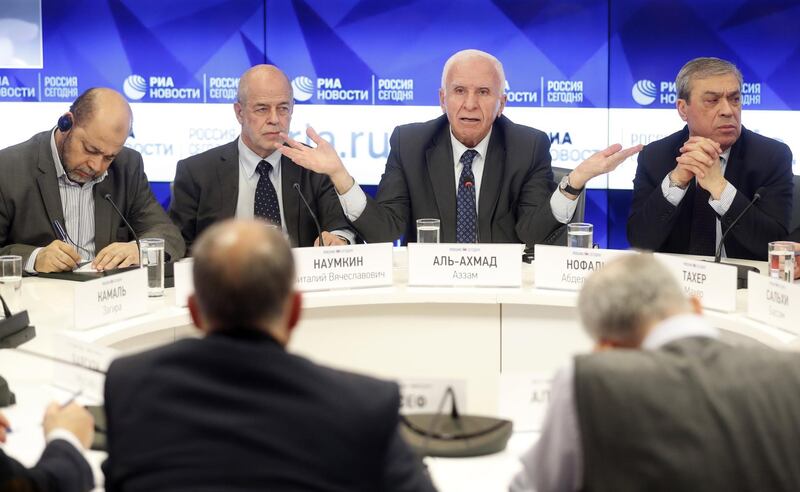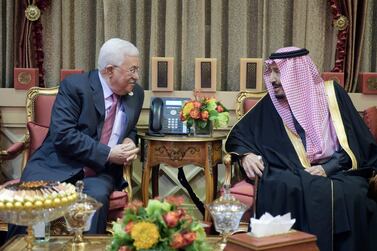Rival Palestinian factions concluded three days of face to face negotiations in Moscow on Wednesday, which while failing to produce concrete results were credited by the delegates as an important step towards reconciliation. But the biggest winner may have been Russia, which delegates said is bolstering its reputation as a Middle East peace broker.
Russia said it had invited the rival groups to Moscow so they could discuss “problems that stand in the way of restoring unity in the Palestinian ranks.”
In announcing three days of intra-Palestinian talks last week, Russia specifically named the main Palestinian factions Fatah and Hamas. The two have been at loggerheads since 2007 when Hamas seized control of the isolated Gaza Strip. The sides have since disagreed over who is responsible for paying civil servants in Gaza. And Fatah insists that Hamas disband its military wing, saying that only the Palestinian Authority, which it controls, is allowed to bear arms.
Even though the Palestinian factions failed to agree on key points of a joint statement following three days of negotiations, members of the main groups Fatah and Hamas said the talks had paved the way new negotiations.
"Tensions have subsided," said Azzam al-Ahmad, a representative of the Fatah delegation.
Mousa Mohammed Abu Marzook, a senior member of the Hamas delegation, said: “The Moscow dialogues has allowed the groups to turn a new page.”
Russia has become an increasingly important political force in the Middle East since entering the Syrian war on the side of embattled president Bashar Assad in 2015.
In the years since, the Kremlin has sought to showcase its ability to speak with both sides of regional conflicts. Moscow has hosted the Taliban as part of Afghanistan peace talks twice since November and President Vladimir Putin is due to bring together leaders of Turkey and Iran in Sochi on Thursday to help bring about a political solution to the war in Syria.
Following a highly publicised press conference in central Moscow, Dr Mustafa Barghouti, who heads the Palestine National Initiative political party, told The National that Russia was increasingly seen on the Palestinian side an impartial and constructive broker.
“We made a breakthrough in the sense that after a year of no talks, Fatah and Hamas are sitting together with other parties in direct negotiations,” he said. “In my opinion what Russia did was miraculous because it allowed us to break the deadlock bringing all sides together.”
Russia’s interest in playing peacemaker comes as Palestinians are increasingly outspoken over what they say is US bias towards Israel. Since US President Donald Trump came of office, he has recognised Jerusalem and Israel’s capital and cut funding for Palestinian aid.
“We see Russia as being completely impartial from internal Palestinian differences,” Mr Barghouti said. “The United States is totally biased.”
Before the talks, expectations were low that the two sides would make meaningful progress on solving existential differences. Fatah has said it is committed to dialogue with Israel to secure a future Palestinian state, while Hamas aims to achieve its goals through military force.
“The biggest problem is philosophical and ideological,” says Hussein Ibish, Senior Resident Scholar at the Arab Gulf States Institute in Washington.
“Under the current circumstances, you can be sure that any ‘reconciliation’ agreement is short-term, tactical and essentially opportunistic on both sides,” he said. “Especially on the part of Hamas if it won't give up its weapons, which it won't.”
Russia’s Foreign Minister Sergei Lavrov met with the delegation on Tuesday afternoon. During the meeting he said Russia would support agreements that the Palestinian leaders adopted in Moscow and reiterated his support for a two-state solution with Jerusalem as the shared capital.
Mr Lavrov criticised Washington’s “unilateral” approach to resolving the conflict, and said a new US peace plan did not include a future Palestinian state with East Jerusalem as its capital.
The United States is hosting a conference on Middle East security and stability in Poland this week, with Iran and the Israeli-Palestinian conflict on the agenda. Jared Kushner, Mr Trump’s senior adviser and son-in-law, is expected to host discussions on ending the decades-long impasse.
Palestinian leaders have called on Arab states to boycott the conference in Warsaw, which Palestinian Foreign Minister Riyad Al Maliki described “as a plot against the Palestinian cause.”
Chief negotiator Saeb Erekat confirmed on Twitter last week that Palestinian leaders would not be attending, adding “we have not mandated anyone to talk on behalf of Palestine.”
Details of what Mr Trump has dubbed “the deal of the century” to resolve the conflict are believed to be revealed after elections in Israel in April. Mr Kushner is scheduled to tour Arab states later this month to win over support for the deal, which Palestinian leaders believe is heavily weighted in Israel’s favour.







